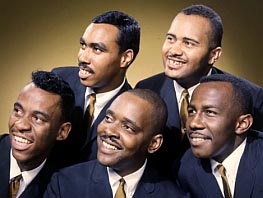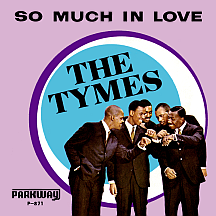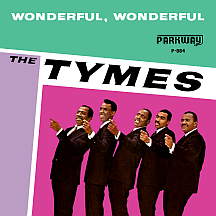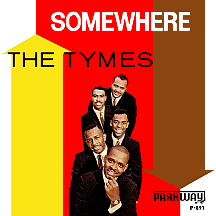THE TYMES
The so-called "golden years" of the vocal groups, doo wop or street corner harmonizers (however you care to identify them) were quickly winding down. The Tymes' hit "So Much in Love" probably comes closest to keeping the feel of what those '50s groups were putting down. Hit-wise, it's easily the genre's most popular song of 1963, boasting a number one ranking on the national charts in July. Cameo-Parkway, Philadelphia's top-of-the-trends record company, in business since 1957 and flush with success in the dance music arena (Chubby Checker, The Dovells, Dee Dee Sharp, The Orlons), went in a slightly less teen-oriented direction with the signing of the Tymes. It would seem the quintet was enjoying a kind of overnight success, yet they had actually been together seven years, placing them in the thick of the mid-'50s vocal group craze, fully involved but lacking the success of many of their contemporaries. But good things come to those who...well, this time, anyway, it was worth the wait.
Baritone Norman Burnett and tenor George Hilliard met at summer camp in the summer of '56 and shortly thereafter put together The Latineers; bass Donald Banks and tenor Albert "Ceasar" Berry (his nickname inspired by the 1931 gangster film Little Caesar starring Edward G. Robinson) rounded out what was initially a foursome. They had appeal to two distinct demographics: youthful fans, by way of the Philly record hops, and the adults who frequented area nightclubs. The act became a quintet in 1960 with the addition of a strong lead vocalist, George Williams, who took a Johnny Mathis-influenced approach tailor-made for the club crowd. The group conveyed a sophisticated pop sound while straying little from their vocal harmony roots.
Leroy Lovett, a jazz pianist and music arranger from Philadelphia who'd been performing and making records since the late '40s, took notice when the group, still using the Latineers name, took part in a talent contest sponsored by the city's great R&B station, WDAS. Lovett suggested they were ready to audition for Billy Jackson, a local singer-songwriter who'd spent the mid-to-late '50s as a member of The Revels (their hit: "Midnight Stroll" in '59) and had only recently joined the staff of Cameo-Parkway. The timing was right, the group was indeed ready, and Jackson signed them. In an effort to come up with a more commercial-sounding name, label boss Bernie Lowe suggested the Tymes.
Williams had written the basic melody and some lyrics for "So Much in Love," impressing Jackson enough that he and songwriter Roy Straigis added their two cents. The recording session took place in the spring of '63 with only bass and drums, and little of that, a mostly a cappella performance with prominent finger snaps. Marlena Davis of the Orlons contributed some high coloratura-style vocal enhancements for romantic effect. Seashore sounds and seagull calls gave the intro a romantic summer vacation feel. What became the album version has a short spoken prologue, 'We find ourselves in a world of our own,' though it was deleted from the beginning for the single release. Initial Parkway pressings were titled "So in Love" (those exact words are sung 17 times) but were quickly changed to "So Much in Love" (even though the longer phrase only comes up twice in the middle of the song). The B side, "Roscoe James McClain," an oddball novelty tune with Ceasar on lead (reminiscent of The Coasters' big 1957 hit "Searchin'" but without its lyrical cleverness), was made, perhaps, as a backup plan to brand the group in the Coasters (or Olympics or Rivingtons or Contours) mold should the ballad fail. There was no need; the gimmicky approach was abandoned after this recording.
While awaiting the results of their first effort, they did double duty as backing singers on some of the label's other recordings, including a few Dee Dee Sharp sessions and Billy Abbott's single "Groovy Baby," getting billed on the label as The Jewels (despite the existence of several other acts with that name). The June release was perfectly "tymed" for a mid-summer peak, at number one no less (the company's first-ever chart-topper by someone not named "Chubby"), outperforming, for one week at least, massively popular singles by the likes of Elvis Presley, Jan and Dean, Peter, Paul and Mary and the first hit by a 13-year-old upstart who called himself Little Stevie Wonder. Top New York radio personality Murray the K, hosting a show at the Fox Theater in Brooklyn that gave the audience faces to match the vocal harmonies they'd been singing along with for weeks, introduced them as "The vocal find of 1963." Appearances on Dick Clark's American Bandstand, conveniently broadcast across America from Philly, were a no-brainer. The Tymes promoted, lip-synced and/or sang each successive release on the show.
It was a risky move to do a Mathis song for the follow-up; listeners might not have embraced the obvious similarity of Williams' style. "Wonderful, Wonderful," which had established Mathis as a major force six years earlier, was chosen. Reviving an "oldie" worked, despite the newer version's starkly similar sound to the original; it went top ten and the Tymes were two-for-two. They got first dibs on "Somewhere" (a different song than the one in West Side Story), penned by Jimmy Wisner and Norma Mendoza. A singer, songwriter and vocal coach, Mendoza had released a jazz album a couple of years earlier titled All About Norma. Wisner was a jazz pianist (his group The Jimmy Wisner Trio backed Norma on her album) and had scored a major hit ("Asia Minor") in 1961 as Kokomo, transitioning into a highly successful songwriter and producer. He counted "Somewhere," as recorded by the Tymes, among his greatest accomplishments. It became a top 20 hit in January 1964.
A remake of "To Each His Own" (a Ray Livingston-Ray Evans film theme with several previous hit versions dating to 1946) had a brief run, as did Jackson-Wisner and/or Straigis efforts like bossa nova ballad "The Magic of Our Summer Love" and and clap-along song "Here She Comes," both catchy, well-produced singles that barely charted. Nor did another Johnny Mathis song ("The Twelfth of Never") spark a turnaround. The Tymes were abruptly dropped from Cameo-Parkway after a mildly productive 1964, amounting to an all-too-short two-year run. A pair of singles for MGM in 1966 included an update of the Nat "King" Cole standard "Pretend," followed by a one-off single on Winchester (a Cameo-Parkway subsidiary), "These Foolish Things (Remind Me of You)," a modern soul arrangement of a song first made popular in 1935 by Benny Goodman, Billie Holiday and other artists.

Continuing their association with Jackson and Wisner, the group signed with Columbia Records in 1968. The first single for the company was an intriguing, uptempo soul-style reworking of "People," the Jule Styne-Bob Merrill song Barbra Streisand took to great heights in '64. The Tymes altered it considerably, prefacing the main verse and chorus with 'Everybody's got to have somebody!' A return trip to the top 40 in December (nearly five years after the last such posting) seemed to bode well, but none of the follow-up discs connected. "She's Gone" in '70 was credited to The Tymes featuring George Williams, giving preference to the lead singer only on that one occasion. The trend popular at the time just didn't feel right; their roots as a group ran deep.
Following a four-year stretch without a record contract, the quintet (with Charles Nixon replacing Hilliard) landed at RCA with Billy Jackson producing and Richie Rome (founder of female disco trio The Ritchie Family) arranging. An infectious track, "You Little Trustmaker," lit up the airwaves in the summer and fall of 1974. The Trustmaker album's liner notes read: "Vocal arrangements by Billy Jackson ably assisted by Lee Andrews"...the selfsame Andrews who'd had a few great '50s hits with his group The Hearts. Jackson was, as it turned out, the lead singer on this one hit.
While the group had enjoyed moderate success in the U.K., there was one unforeseen eruption late in the year: the unabashed romanticism of "Ms. Grace" took the British music scene by storm and hit number one in January 1975! The Tymes' second coming kept them busy throughout the late '70s with a dizzying array of worldwide bookings; "It's Cool," a smooth, sexy 1976 R&B hit, extended their good fortune. Berry departed and two female vocalists, Terri Gonzalez and Melanie Moore, were added, giving the group a decidedly different image, if only for the next few years.
At some point it became obvious there was renewed interest in the group, particularly on the Carolina beaches. But that wasn't the only region where people would come in droves to see them work their summer (and autumn-winter-spring) magic. In the late '70s the hit-and-miss routine of making records ended, at least for the next couple of decades. But as a performing group - always with two or three original members taking the stage - the career of The Tymes was just beginning to gain momentum.
NOTABLE SINGLES:
- So Much in Love /
Roscoe James McClain - 1963 - Wonderful, Wonderful - 1963
- Somewhere - 1964
- To Each His Own /
Wonderland of Love - 1964 - The Magic of Our Summer Love - 1964
- Here She Comes /
Malibu - 1964 - The Twelfth of Never - 1964
- Pretend - 1966
- (A Touch Of) Baby - 1966
- These Foolish Things (Remind Me of You) - 1967
- People - 1968
- God Bless the Child - 1969
- She's Gone - 1970
as the Tymes featuring George Williams - You Little Trustmaker - 1974
- Ms. Grace - 1974
- It's Cool - 1976
- How Am I to Know (The Things a Girl in Love Should Know) - 1977




